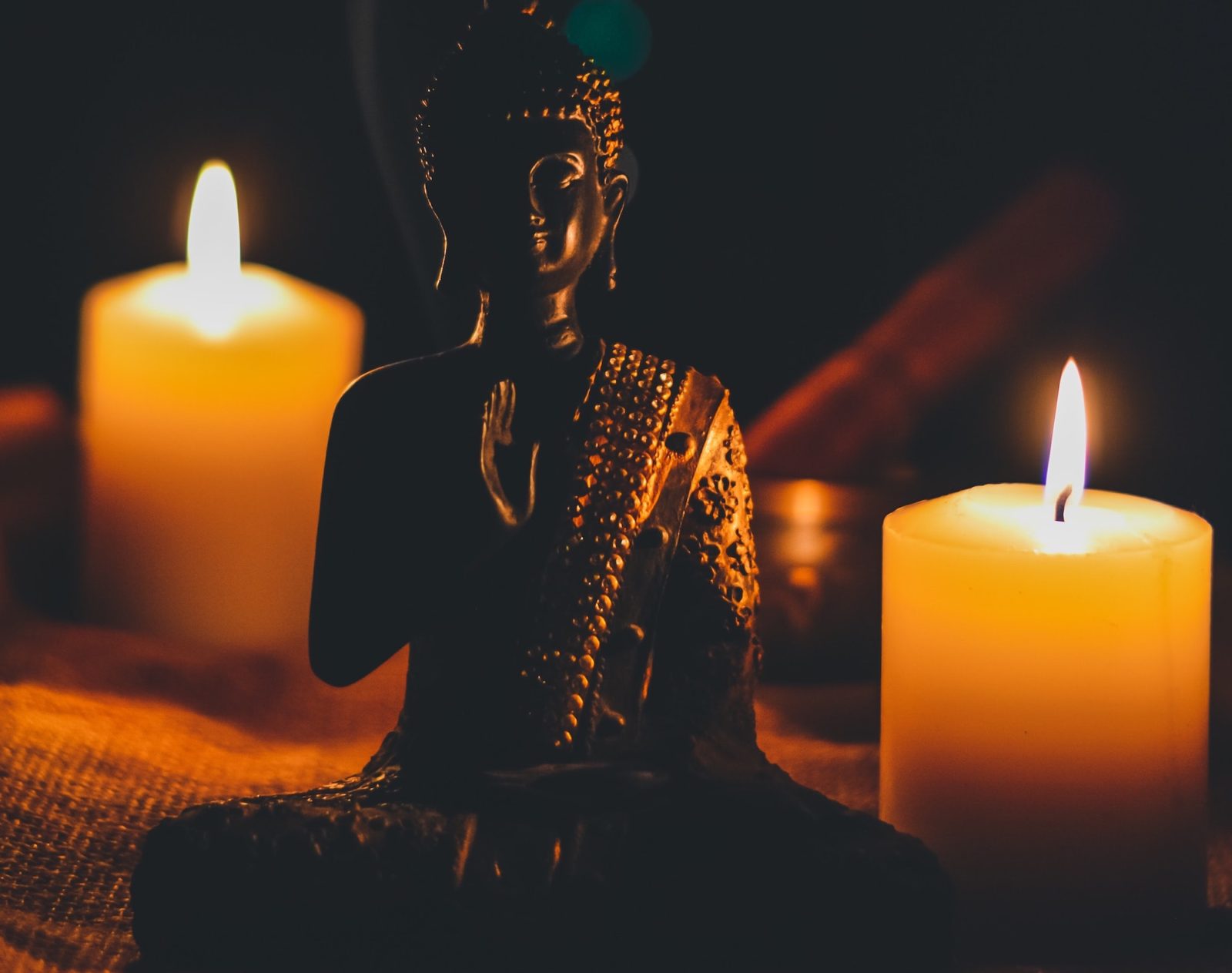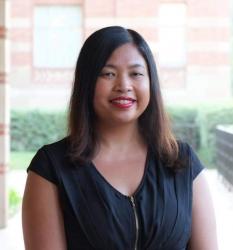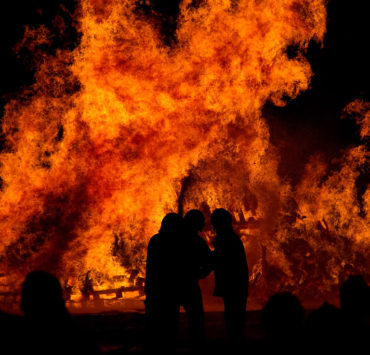
Today, I did something brave.
After the children left for school and my husband left for his first work interview since we arrived in Beaverton, Oregon, I put on every shirt I owned—three to be exact, one on top of the other. Then I zipped up trousers, because for the first time since we arrived, even I will admit, my sarong was much too thin to withstand the cold weather. Next, I buttoned the wool coat, which according to our sponsor Sue, was a rare find from the church’s donation bin. I checked the pockets for any loose change—apparently people do that here—but all I found was a hole in the left pocket and a spare glove in the right.
I fastened a thick cotton hat over my ears, fitted each finger into knitted gloves, and wrapped a scarf around my neck in two loops, the way Sue showed me.
I looked like a swollen noodle, left in the broth a minute too long.
I’d never worn so much clothing in my life.
Before leaving, I counted a few dollars and patted the bills safely in my coat pocket. Then I fished the two most important post-its from my collection in the top dresser drawer. The first was the map Sue drew up for me—directions from the apartment to the grocery store and back. The second spelled out the words ‘Betty Crocker.’
* * * * *
Since last Sunday’s dinner at Sue’s, I couldn’t stop thinking about strawberry shortcake.
Soft crumbly bread the color of lotus petals and strawberry bits somehow made sweeter by smooth white cream have made even runny eggs in soy sauce pale in comparison.
And eggs were a delicacy back in Kao-I-Dang refugee camp, where just a month ago, I traded a Thai local a fourth of my weekly rice rations for two precious eggs.
According to Sue, the same eggs that swim in soy sauce are also a base ingredient in cake. Now, when I look at the eggs sitting in the fridge—twelve instead of two—all I can see is the number of cakes they could transform into.
I stared at the grocery list I’d drawn up based on Sue’s description—a circle for eggs, a triangle for oil, and a square for the box of cake mix. I crossed off the first two items and knew there was no avoiding a trip to the grocery store.
Before last Sunday’s dinner, I didn’t even know what cake was.
“We missed ya’ll at service this morning!” Sue said, as we took our seats around the dining table last Sunday evening.
“The kid…they got homework,” my husband pointed to our son and daughter, who looked at him with questioning eyes. In fact, they had spent all morning watching a show called Sesame Street. They repeated the English words that fell from the dolls’ gaping mouths, those colorful dolls who never stopped smiling, even when they spoke.
“That’s too bad! Pastor John gave a delightful sermon about the last supper.”
She nodded toward a painting on the wall, where men the color of Sue were having dinner at a long table. The painting was sandwiched between two wooden crosses, larger versions of the one that dangled from Sue’s neck.
“I have a great idea! If the kids ever need any help in school, our youth group has excellent scholars!”
I heard the word ‘help’ and waved my hand in protest.
“No help.”
Sue just smiled and asked us all to join hands while her husband said grace. I looked up while everyone’s heads were bowed in prayer, my eyes meeting my daughter’s curious gaze from beneath long straight bangs that framed her face like the edge of a cleaver knife. Next to her, my son hung his shaggy head of unbrushed hair, the corner of his lips turned slightly upward, his eyes shut in complete trust.
My husband squeezed my hand, as if asking me to hold my tongue just this once. And maybe he was right. After all, Sue’s church sponsored us from Kao-I-Dang to the much safer—albeit much colder—climate of Beaverton, Oregon, where god gave everyone a reason to smile.
He squeezed my hand once more, lest I forget, it was also Sue that came to our rescue last Wednesday.
After dinner, my son and daughter joined Sue’s two boys in a game called hide-and-seek, where the “it” person closes their eyes and counts to ten while the others scramble to hide behind the couch, under a table, or in a closet. I would have hidden behind the shower curtains in the bathtub with the lights off— there’s no better camouflage than darkness.
I looked over at my husband, whose eyes squinted at the television set as Sue’s husband explained what they were watching. Basketball was nothing more than a bunch of grown men running between two sets of nets, trying to throw a ball through the basket. One team wore purple and yellow. The other wore green and white.
If there’s anything I hate, it’s uniforms. I looked down at my faded blue blouse and tugged at the fabric to remind myself that it’s real—the time of all-black clothing is a thing of the past.
While everyone else chatted, I got up and started stacking the plates, until Sue stopped me.
“Please don’t, you’re our guest! Sit down and enjoy this instead.” She handed me a slice of what appeared to be soft pink bread. Strawberry pieces separated each layer and white cream denoted the top layer.
“Thank you.”
“You’re very welcome.” Sue smiled, placing a fork next to my plate.
I scraped off the smallest morsel with the edge of my fork and drew it to just the tip of my tongue. Several bigger bites followed and before I knew it, my entire mouth came to life.
Nothing has tasted this sweet since I last had my mother’s taro pudding dessert seven years ago, during what we didn’t know would be her last New Year’s celebration.
Ma always brought two large pots of taro pudding to temple on New Year’s Day—one for the monks and one for anyone lucky enough to get a bowl before the pot ran dry.
That year, just like every year since I was a little girl, I helped Ma prepare the alms bowls for the monks—as she scooped the rice and arranged the vegetables with the runny prahok dip, I ladled taro pudding for each tray.
What got me through the long session of Pali chants was the taro pudding at the other end of the monks’ blessings.
Ma only made dessert once a year. Just having one bowl—with warm coconut milk, soft taro chunks, and the tapioca pearl texture—was enough to carry me through the next year.
But on New Year’s Day the following year, the Khmer Rouge took over Phnom Penh and 1975 became a year the monks never blessed.
I’ve always wondered what happened to Ma’s two pots of taro pudding dessert that year.
Surely, that morning, Ma must’ve woken up before the sun rose, as she did every New Year’s Day. Boiling taro to its desired softness is a multi-hour process and Ma watched over her pots as she would newborns, one minute, she’s fanning the flames to bring the water to a boil, the next she’s piling in straw to bring the heat down. When you tend to taro the way Ma did, you draw out the sweetness hiding at its core.
When Ma woke up that morning, she didn’t know it would be the first year her dessert would go untouched.
Sue’s strawberry flavored bread was not Ma’s taro pudding, but it was sweet just the same.
“How?” I asked, when just a few crumbs remained. I pointed to the empty plate in front of me.
“From a box!” Sue laughed and wrote down two words on a yellow post-it.
Bet-ty Croc-ker. She pronounced each syllable slowly so I could write the Khmer pronunciation under it.
She sent me home with a baking sheet pan, a whisk, directions to the grocery store, and instructions on how to use the oven in our new apartment.
On the way out, I clutched the post-its in my left palm. Even if they ended up crumpled, at least I knew they would make it home.
* * * * *
Even with all the clothes on, the cold air slapped my face as soon as I stepped outside.
Sloshy ice fell from the sky and the ground looked like it was covered in coconut shavings.
I felt for my Buddha pendant, where it always rested just beneath my collar bone, underneath all the layers. Along with my wedding band, it was the only thing I carried with me from Cambodia.
Buried at the edge of the garden when our homes were raided, unearthed with each relocation and hidden against the bare skin of my chest, both objects traveled with me from my village, to the labor communes, to the refugee camp, and finally, to Beaverton.
If discovered by the cadres, the ring would have been confiscated—a sister of a classless society had no business holding onto gold.
But the Buddha pendant could have cost me my life—there’s no place for Buddha in an equal society.
I rubbed the pendant and whispered a short Pali chant for protection—the same chant I whispered every night on our journey through dark forests, through moist jungle floors, feeling our way to Thailand without a map. I made it then and I will make it now.
* * * * *
The grocery store is only four blocks away.
“You walk straight and take a left at the third block. It should be right next to the McDonald’s, remember the golden arches?” Sue used her index fingers to draw two curves in the air.
I’d nodded, even though I only understood a few words. But I’m good with pictures, and so I paid close attention to the map and the symbols she left for me.
“Remember, even if you get lost again, don’t be afraid to call. I’ll come find you.”
But I can’t call Sue again. Not after what happened last Wednesday.
I can count the number of times I’ve cried on one hand, and I’m not proud that last Wednesday was one of them.
What made that day so hard?
It’s not like I’m in Cambodia, where just a little over two years ago, a cadre seemed to be breathing down my neck every hour. Work faster. Dig deeper. Plow more. Eat less.
It’s not like I’m in Kao-I-Dang, where just a few months ago, a Thai soldier told me I was overstaying my welcome, even as he handed me our food rations.
I’m in Beaverton, Oregon. And all they asked me to do was look for three to four jobs a week and to get the signatures to prove it.
But that Wednesday, after getting shooed away by yet another business owner who couldn’t understand what we wanted, I was reminded how some fruit never sweeten. No matter how you till the soil, no matter how many kind words you speak while watering, no matter how many days you wait for the fruit to ripen, some fruit will always come out bitter.
So, for the first time in our lives, my husband and I decided to end the workday before the sun. At 3 P.M., we huddled inside the bus, and I fell asleep against his shoulder. He must’ve fallen asleep too, because the next moment, we woke up to the bus driver’s voice, “End of the line!” And he too, shooed us out.
As we exited, the door closed on my sarong and I had to pull it free before the bus flew past us.
Outside, it was nearly pitch black but for two streetlamps. I looked around and could not recognize the neighborhood. Not one building looked familiar. Not one business. Not even a McDonald’s, with the golden arches.
I grasped for my husband in the dark, feeling his shoulder, then the slight bend of his elbow, until I found his hand. I gripped his palm tightly against my own.
“It’s okay,” he pulled me close with his free arm.
“No, it’s not.” I shook my head against his shoulder.
“Sure, it’s dark. And sure, we don’t know where we are. But at least I can take the next step without worrying something’s gonna blow up!”
He released my hand and took a few steps forward and a few steps backwards. He did it again and again until I lunged at him, placing both my hands on his shoulders to stop him.
“Don’t move!” I shouted. I grabbed both of his hands this time and glared at him in the dark, daring him to let go again.
And then I felt the wetness on my face and thought, great—now it’s raining!
It wasn’t long before I noticed the water was coming from my own eyes.
Realizing his jokes couldn’t solve all our problems, my husband leaned in and left slow kisses wherever the tears fell. For a moment, I felt lost in a different way.
It would be nearly an hour before we found a payphone and dialed the number on one of my in-case-of-emergencies post-its.
Even when Sue arrived, the tears did not stop.
She stepped out of her car in a crisp white coat, her hair straight and neat, every strand in place.
“Oh honey.” She gave me a hug and patted my head like I was a child.
In her dustless car, I was suddenly aware of the dirt against my sarong and the way the chaotic waves of my hair pointed in all directions. I sat very still. I wanted to leave no traces.
When Sue dropped us off in front of our apartment, she handed me a bible.
“In case you ever get lost again.”
* * * * *
So no, I don’t think I’ll be calling Sue. Even if I can’t find my way home.
I followed each step on the post-it and made my way to the grocery store.
I showed the cashier the post-it and she pointed me to aisle five, where I found boxes and boxes of Betty Crocker cake mix.
I brought two to the cashier, ready to splurge. Because even if I only had a few dollars left of our monthly allowance, the sweetness will sustain us.
But when I reached for the dollars in my coat pocket, I realized it was empty.
Of course. There wasn’t a hole in just the left pocket. But in the right pocket, where the spare glove had been, was a hidden hole.
Instead of handing the cashier money, I handed her back the two boxes of Betty Crocker cake mix.
She looked at me in confusion until I put down the boxes and pulled out the empty pockets from my coat.
“Tomorrow.” I said and turned toward the exit.
“Here, give me those,” she said, taking the two boxes, “and take this.” She handed me an empty paper bag. “Help me bag groceries and work for tips until you make enough for these two boxes.”
I didn’t quite understand her, but I took the bag and stood where she pointed at the other end of the cashier station. She placed a glass jar in front of me and said “we bag for tips” to each customer, which prompted them to deposit a few silver and copper coins into the jar in exchange for the filled bags. The customers with the most generous smiles even deposited a folded dollar bill or two.
In two hours, I made enough tips to go home with two boxes of cake mix.
* * * * *
That afternoon, I baked a cake.
Sure, I left it in the oven for a minute too long. And sure, it was a little burnt at the edges. But I covered it in vanilla frosting until it was as white as the ground outside.
No one would know the difference.
My son and daughter walked through the front door just as I finished smoothing over the last layer of frosting.
“Ooo!” My son squealed as he wiggled out of his sneakers and flung his backpack on the floor, practically running toward the kitchen.
“Smells good, Ma.” My daughter untied her sneakers before slipping them off and placing them on the shoe rack. Then she picked up her brother’s sneakers and lined them neatly alongside her own and hung both their backpacks on the coat rack, before joining us around the cake.
“Can you watch your brother while I run a quick errand?” I reached over to part my daughter’s razor-like bangs down the middle, tucking the strands behind her ears to get a good look at her bright eyes. “Your father should be home soon.”
My daughter nodded, her eyes fixed on the white frosting.
“Good girl.” I said, as I cut three slices of cake and transferred two onto porcelain plates.
I handed each of them a slice before placing the third into a plastic Tupperware container. Then I copied the words ‘Betty Crocker’ onto a post-it and pressed it against the red lid.
On another post-it, I wrote out the phrase ‘No, thank you.’ According to Sue, this was the polite way to say no.
I pressed the post-it against the hard black cover of Sue’s bible.
Afterwards, I buttoned, fastened, and looped all the layers back on before placing Sue’s bible and my perfect slice of cake into a large brown paper bag.
The sun was starting to set, but Sue’s house was just a few streets away.
I knocked three times on Sue’s front door and placed the paper bag in her outstretched arms.
“Betty Crocker.” I said before waving goodbye and making my way back down the familiar road home.
I smiled like the good Christians in Beaverton do.

Layhannara Tep was born and raised in Long Beach, California. She is the daughter of Cambodian refugees, an experience that continues to shape her writing. She is currently pursuing her master's in Asian American Studies at UCLA, where she is working on a collection of short stories about the Cambodian American diaspora. Layhannara enjoys stories and art in all forms. In her free time, you can find her at the movies, enjoying live music, or getting lost in a museum (she seriously gets lost everywhere). Layhannara enjoys ice cream on rainy days and iced coffees in any weather. She has a growing to-be-read pile. If you see her at a bookstore, please remind her she's not allowed to buy a new book until she finishes one she already owns. Seriously.







